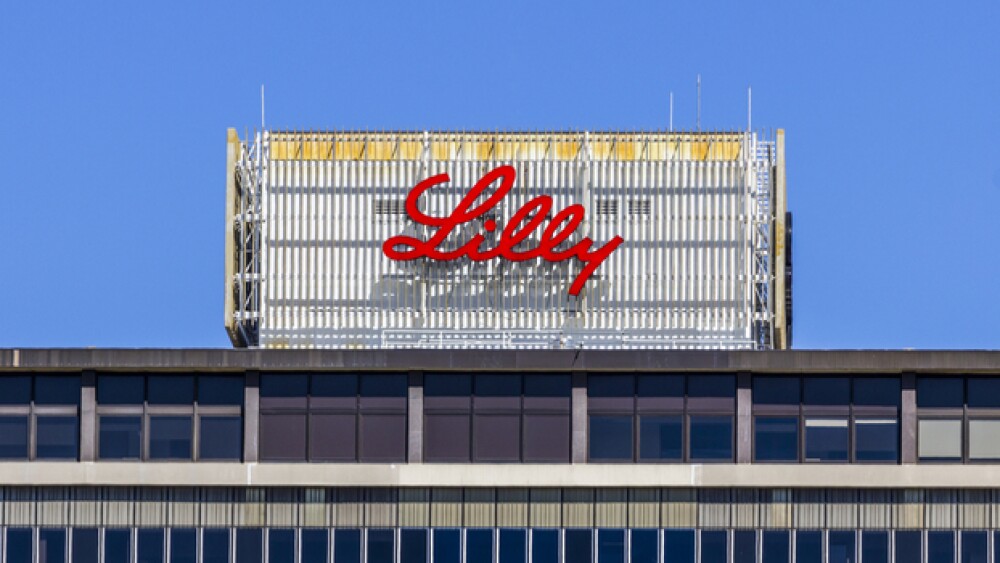Eli Lilly’s ANNOUNCE Phase III clinical trial of Lartruvo (olaratumab) in advanced or metastatic soft tissue sarcoma failed to meet the primary endpoints of overall survival.
Jonathan Weiss / Shutterstock.com
Eli Lilly and Company’s ANNOUNCE Phase III clinical trial of Lartruvo (olaratumab) in advanced or metastatic soft tissue sarcoma (STS) failed to meet the primary endpoints of overall survival (OS).
Lartruvo, a platelet-derived growth factor receptor alpha blocking antibody, was being studied in combination with doxorubicin in patients with STS compared to doxorubicin alone, a standard of care. It didn’t meet OS in the full study population or in a sub-population of patients with leiomyosarcoma. There was no difference in survival between the study arms.
In a Phase II trial of 133 patients, the combination had shown an OS benefit, which resulted in the U.S. Food and Drug Administration (FDA) granting the drug accelerated approval and conditional marketing authorization by the European Medicines Agency (EMA).
The company indicates that continued approval will require verification of clinical benefit in a confirmatory trial, and since the ANNOUNCE trial didn’t confirm it, they are in talks with regulators on what the next steps for the drug might be.
Meanwhile, patients who are receiving the drug can, if their physician believes they are receiving clinical benefit, continuing their therapy. However, no new patients will receive Lartruvo with STS outside of clinical trial participation.
Soft tissue sarcoma is a complex disease marked by multiple subtypes, which complicates diagnosis and treatment. Sarcomas are described as “relatively rare” and typically develop in connective tissue, which includes fat, blood vessels, nerves, bones, muscles, deep skin tissues and cartilage. The American Cancer Society estimated 13,040 newly diagnosed cases in 2018, with about 5,000 of those people likely to die from it.
“Lilly was surprised and disappointed that Lartruvo did not improve survival for patients with advanced soft tissue sarcoma in this study,” stated Anne White, president of Lilly Oncology. “Lilly is committed to helping people who have soft tissue sarcoma and we will carefully study the detailed data in an effort to better understand the different results between the two trials. We are thankful for the patients and physicians who have participated in the ANNOUNCE study.”
The study results come only weeks after the company announced it was acquiring Loxo Oncology for $8 billion. A look at regulatory filings related to the acquisition indicates the company wanted to close the deal prior to the JP Morgan Healthcare Conference held last week. And in an unusual note, the deal came together in a surprisingly short two weeks.
The two companies had been in contact since April 2018, but acquisition talks only began in December. The deal was announced December 20.
Loxo has one FDA-approved drug on the market, Vitrakvi (larotrectinib), which was only recently approved. It is an oral TRK inhibitor developed and commercialized in collaboration with Bayer.
Regulatory documents suggest that Lilly was most interested in one of Loxo’s pipeline products, LOXO-292, which has “positive interim data” in early-stage clinical trials and had been granted breakthrough status by the FDA in September. LOXO-292 is an oral RET inhibitor being evaluated across multiple cancer types.
Loxo also has LOXO-305, an oral BTK inhibitor currently in Phase I/II, being evaluated in several B-cell leukemias and lymphomas. It also has LOXO-195, a follow-on TRK inhibitor being studied by Loxo and Bayer.
Loxo didn’t hunt for competing bids and Lilly apparently revised its offer a single time, going from the initial $230 per share to $235 per share.





